2021 Research Misconduct News
This page offers news-worthy topics for the Responsible Conduct of Research and Research Misconduct. Note: Due to the nature of web page evolution, some links may be broken.
| January | February | March | April | May | June |
| July | August | September | October | November | December |

Who's on first? Duking out scientific paper authorship order
December 13, 2021
Stanford | Scope 10K
By Krista Conger
"It's been over 80 years, but Abbott and Costello's famous comedic skit "Who's on First" lives on in our collective memories. Their increasingly ridiculous conversation about baseball and the name of the player on first base can still reliably produce a giggle in many circles.
But in the lab, questions about order can be anything but a laughing matter - particularly when it comes to the list of authors on a scientific paper. Many nonscientists don't realize that, traditionally, the most important places on the roster are the first - indicating the person who conceived of and performed most of the research discussed in the paper - and the last - a hallowed place reserved for the senior scientist in whose laboratory the research was conducted."
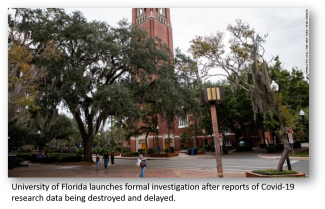
University of Florida launches formal investigation after reports of pressure to destroy COVID-19 research data
December 11, 2021
CNN
By Leyla Santiage and Alta Spells
"A formal investigation has been launched by the University of Florida after an internal report detailed a culture of fear among faculty members claiming political influence on campus as well as instances of pressure to destroy and delay publication of Covid-19 research data.
Vice President of UF Research David Norton announced the investigation in an email to faculty and staff Friday morning, according to the university. The email indicates the results of the investigation will be made public upon completion, but did not give a timeline."

Managing up: how to communicate effectively with your PhD adviser
Your supervisor has a vested interest in your success. Set the right tone and communication style when you meet with them.
December 10, 2021
Nature | Career Column
By Lluis Salo-Salgado, Angi Acocella, Ignacio Arzuaga Garcia, Souha El Mousadik, & Augustine Zvinavashe
"When you start a PhD, you also begin a professional relationship with your PhD adviser. This is an exciting moment: interacting with someone for who you might well have great respect and admiration, but who might also slightly intimidate you.
The will have their own management style, but 'managing up' is important, so you need to identify the style that will help you to thrive academically, and communicate that to your adviser.
In September, we ran a panel discussion for new graduate students in the department of civil and environmental engineering at the Massachusetts Institute of Technology in Cambridge."

Understand the real reasons reproducibility reform fails
Lack of rigour is often blamed on pressure to publish. But ethnographers can find out what truly keeps science from upping its game.
December 6, 2021
Nature
By Nicole C. Nelson
"A decade ago, the US National Institute of Neurological Disorders and Stroke convened a workshop on how to improve the rigour of preclinical research. Its recommendations were surprisingly straightforward: scientists should mask (or ‘blind’) their studies; randomize; estimate appropriate sample sizes; and specify rules for data handling (S. C. Landis et al. Nature 490, 187–191; 2012). Ten years on, many preclinical scientists still do not take these basic steps.
Ask most advocates of rigorous science why this is, and they will answer with two words: perverse incentives. Scientists are rewarded for getting things published, not for getting things right, and so they tend to favour speed and ease over robustness."

Violation of research integrity principles occur more often than we think
December 3, 2021
Wentao Li, Lyle C Gurrin, Ben W Mol, Violation of research integrity principles occur more often than we think, Reproductive BioMedicine Online, 2021, ISSN 1472-6483, https://doi.org/10.1016/j.rbmo.2021.11.022.
"The science community generally believes that the violation of research integrity is rare. Built upon this belief, the scientific system takes little effort to examine the trustworthiness of research. Research misconduct refers to an intentional violation of research integrity principles, which has an extensive and far-reaching impact on the trustworthiness and reputation of science."

The Use of Questionable Research Practices to Survive in Academia Examined With Expert Elicitation, Prior-Data Conflicts, Bayes Factors for Replication Effects, and the Bayes Truth Serum
November 29, 2021
frontiers in Psychology
By Rens van de Schoot, Sonja D. Winter, Elian Griffioen, Stephan Grimmelikhuijsen, Ingrid Arts, Duco Veen, Elizabeth M. Grandfield, and Lars G. Tummers
The popularity and use of Bayesian methods have increased across many research domains. The current article demonstrates how some less familiar Bayesian methods can be used. Specifically, we applied expert elicitation, testing for prior-data conflicts, the Bayesian Truth Serum, and testing for replication effects via Bayes Factors in a series of four studies investigating the use of questionable research practices (QRPs). Scientifically fraudulent or unethical research practices have caused quite a stir in academia and beyond. Improving science starts with educating Ph.D. candidates: the scholars of tomorrow. In four studies concerning 765 Ph.D. candidates, we investigate whether Ph.D. candidates can differentiate between ethical and unethical or even fraudulent research practices. We probed the Ph.D.s’ willingness to publish research from such practices and tested whether this is influenced by (un)ethical behavior pressure from supervisors or peers. Furthermore, 36 academic leaders (deans, vice-deans, and heads of research) were interviewed and asked to predict what Ph.D.s would answer for different vignettes. Our study shows, and replicates, that some Ph.D. candidates are willing to publish results deriving from even blatant fraudulent behavior–data fabrication. Additionally, some academic leaders underestimated this behavior, which is alarming. Academic leaders have to keep in mind that Ph.D. candidates can be under more pressure than they realize and might be susceptible to using QRPs. As an inspiring example and to encourage others to make their Bayesian work reproducible, we published data, annotated scripts, and detailed output on the Open Science Framework (OSF).

Transparency of peer review: a semi-structured interview study with chief editors from social sciences and humanities
November 18, 2021
Karhulahti, VM., Backe, HJ. Transparency of peer review: a semi-structured interview study with chief editors from social sciences and humanities. Res Integr Peer Rev 6, 13 (2021).
"Open peer review practices are increasing in medicine and life sciences, but in social sciences and humanities (SSH) they are still rare. We aimed to map out how editors of respected SSH journals perceive open peer review, how they balance policy, ethics, and pragmatism in the review processes they oversee, and how they view their own power in the process."
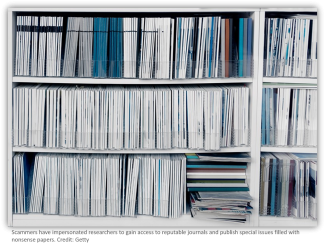
Scammers impersonate guest editors to get sham papers published
Hundreds of junk-science papers have been retracted from reputable journals after fraudsters used ‘special issues’ to manipulate the publication process. And the problem is growing.
November 8, 2021
Nature
By Holly Else
"Hundreds of articles published in peer-reviewed journals are being retracted after scammers exploited the processes for publishing special issues to get poor-quality papers — sometimes consisting of complete gibberish — into established journals. In some cases, fraudsters posed as scientists and offered to guest-edit issues that they then filled with sham papers."

University offers to rehire professor acquitted of hiding China ties
Supporters of Anming Hu have decried his treatment by the University of Tennessee
October 18, 2021
Science
By Jeffrey Mervis
"The University of Tennessee, Knoxville (UTK), has offered to reinstate Anming Hu, a tenured engineering professor acquitted of federal charges that he failed to disclose ties to China on a grant application."

Do we achieve anything by teaching research integrity to starting PhD students?
October 14, 2021
Nature
Shila Abdi, Steffen Fieuws, Benoit Nemery & Kris Dierickx
Abstract
Education of young researchers has been proposed as a way to promote research integrity. However, the effectiveness of research integrity education on PhD students is unknown. In a longitudinal design, we surveyed over 1000 starting PhD students from various disciplines regarding knowledge, attitude and behaviour before, immediately after and 3 months after a compulsory 3-h course given by a panel of experts. Compared with a control group who did not follow the course, the course recipients showed significant (multivariate analysis) but modest improvements in knowledge and attitude scores immediately after the course, but not after 3 months; a prolonged impact was apparent regarding behaviour. Moreover, the course spurred 93% of PhD students to have conversations about research integrity and 79% declared applying the content of the course. Among other interventions, formal education in research integrity may contribute to foster a climate of research integrity in academia.
National Academies of Sciences, Engineering, and Medicine; Policy and Global Affairs; Committee on Science, Engineering, Medicine, and Public Policy; Committee on Responsible Science. Fostering Integrity in Research. Washington (DC): National Academies Press (US); 2017 Apr 11. 5, Incidence and Consequences. Available from: https://www.ncbi.nlm.nih.gov/books/NBK475945/

University of Washington settles DOJ claims of grant fraud
October 12, 2021
AP News
"SEATTLE (AP) — The University of Washington has agreed to pay more than $800,000 to settle Justice Department allegations that a professor submitted false documentation relating to a highly competitive grant."

Federal Research: Agency Actions Needed to Address Foreign Influence
GAO-22-105434, U.S. GOVERNMENT ACCOUNTABILITY OFFICE: A Century of Non-Partisan Fact-Based Work
Published: Oct 05, 2021. Publicly Released: Oct 05, 2021
"To protect U.S. investments in scientific research from undue foreign influence, federal agencies should have conflict of interest policies and require researchers to disclose foreign interests."
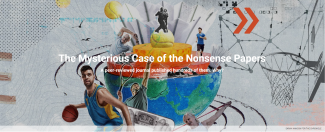
The Mysterious Case of the Nonsense Papers
A peer-reviewed journal published hundreds of them. Why?
Tom Bartlett, The Chronicle of Higher Education
September 28, 2021
“A peer-reviewed journal recently published a mind-bending paper. It begins with a highly technical section about groundwater seepage before delving into a lively discussion of dance training. The paper shifts back and forth between the two topics, informing the reader about rare-earth elements before urging dancers to “tighten buttocks” during warm-ups. There are tables and graphs, citations and hyperlinks. It’s all very sober and scientific-seeming and yet, at the same time, completely bonkers.”
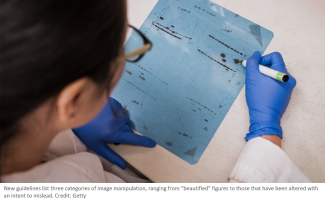
Publishers unite to tackle doctored images in research papers
Eight major publishers have issued joint guidelines for how journal editors can spot and deal with suspicious images or data
Holly Else, Nature
September 28, 2021
“Some of the world’s largest publishers have come together to tackle the growing problem of image manipulation in scientific papers. They have developed a three-tier classification system that editors can use to flag suspicious content, and detailed, step-by-step instructions on how to deal with doctored images.”
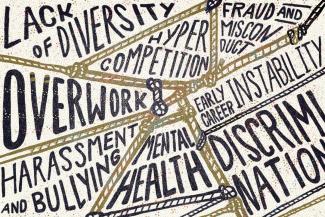
Can we fix research culture?
Collection of articles
Chemistry World
September 28, 2021
“Hypercompetition. Overwork. Career instability. Lack of diversity. Discrimination. Misconduct. These are just some of the characteristic problems of current academic research culture. Despite the strain these issues place on researchers, improvement have been slow to emerge due to the complex network of interactions between all the parties involved in academic research – including funders, universities, publishers and the researchers themselves.
In this collection we look more closely at these issues from the viewpoints of the people affected by them, and highlight some of the solutions being proposed to make academic research environments healthier and happier places to do science.”

Why Don’t We Teach Ph.D.s to Be Mentors?
Adding mentoring skills to doctoral training is a key to graduate-education reform
Maria LaMonaca Wisdom, The Chronicle of Higher Education
September 21, 2021
“Since January, I’ve spent hours on Zoom fielding questions from doctoral students and postdocs about mentoring and mentors. They’ve been asking questions like:
- “Can you sever a relationship with a mentor without burning bridges?”
- “How important is ‘chemistry’ in a mentor-mentee relationship?”
- “What’s a ‘mentoring persona,’ anyway? Can I be a good mentor if I don’t have one?”
I never expected to teach a graduate course on mentoring, nor did I expect that, when I did, my students would be so captivated by the topic. But with a pandemic curtailing opportunities for in-person interactions, mentoring — or the lack thereof — has been on everyone’s minds.”
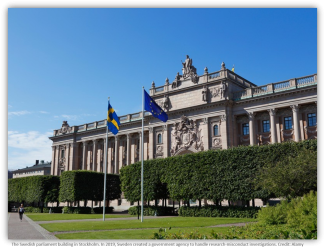
Swedish research misconduct agency swamped with cases in first year
The newly formed government organization tackled 46 research-fraud investigations in 2020 - three times as many as expected.
Holly Else, Nature
September 13, 2021
"Scientists have inundated Sweden’s new national research-misconduct investigation agency with cases, and there is no sign of a let-up in referrals.
Researchers brought 46 cases to the organization — called the National Board for Assessment of Research Misconduct (NPOF) and based in Uppsala — in its first year, according to a report detailing its activities in 2020. This caseload was three times higher than officials were expecting.
In most countries, universities and research institutions deal with misconduct allegations in-house, which can lead to some cases not being handled fairly or transparently."

How misconduct helped psychological science to thrive
Grass-roots action against bad behaviour has spurred reform — and should keep going
Jelte Weichert, Nature
September 7, 2021
“Ten years ago this week, I was startled to see tweets saying that Dutch psychologist Diederik Stapel, a former colleague, had admitted to falsifying and fabricating data in dozens of articles. My inbox filled with e-mails from fellow methodologists, researchers who examine and refine research techniques and statistical tools. They expressed disbelief about the extent of the misconduct, but also a sense of inevitability. We all knew that sloppiness, low ethical standards and competitiveness were widespread.
What happened next was inspiring: an open debate that went far beyond misconduct and focused on improving research.”
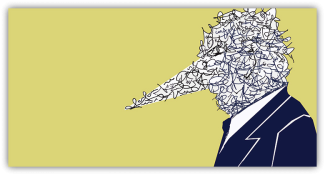
Leading the charge to address research misconduct
Like all science, the field of psychology is vulnerable to fabrication, falsification, and poor research practices, but psychologists are leading the charge for change
September 1, 2021
By Stephanie Pappas, American Psychological Association
Vol. 52 No. 6, Print version: page 71
"When James DuBois, ScD, PhD, launched a training program in 2013 for researchers caught failing to comply with research protocols, plagiarizing, or falsifying and fabricating data, it was controversial, to say the least. The program’s launch was accompanied by a feature article in Nature’s news section, and much of the feedback was incensed (Cressey, D., Vol. 493, No. 197).
'Oh, my goodness, the chat for the online story!' DuBois, an applied psychologist at the Washington University School of Medicine in St. Louis, recalled. 'There was so much hate.'
It’s no wonder. Misconduct flies in the face of the values of scientific research, which at its heart is about the search for truth."
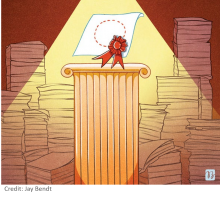
Why Bad Science Is Sometimes More Appealing Than Good Science
Researchers cite studies that can’t be replicated weirdly often.
Naomi Oreskes, Scientific American
August 1, 2021
“A recent paper makes an upsetting claim about the state of science: nonreplicable studies are cited more often than replicable ones. In other words, according to the report in Science Advances, bad science seems to get more attention than good science.”